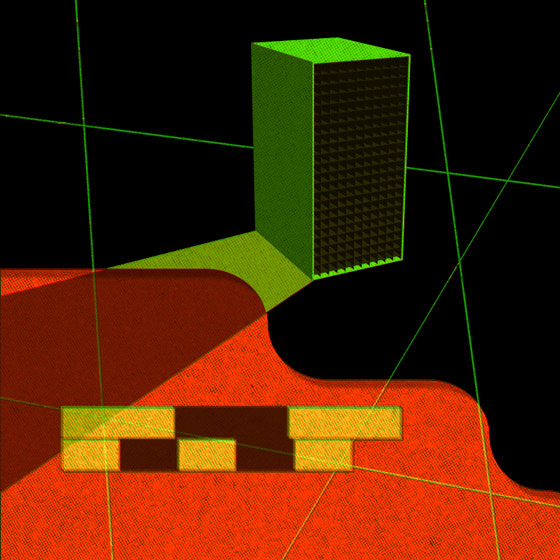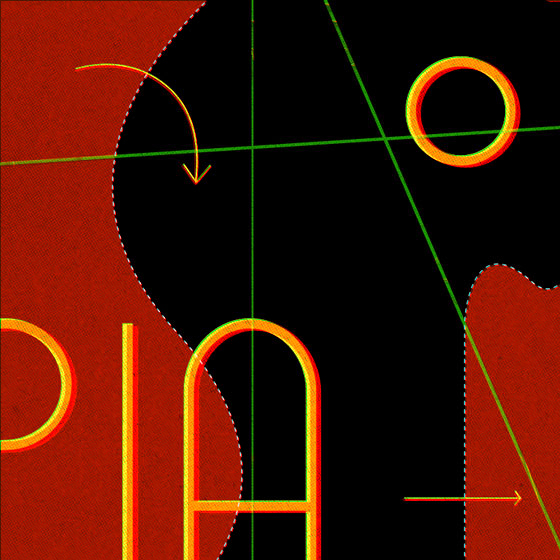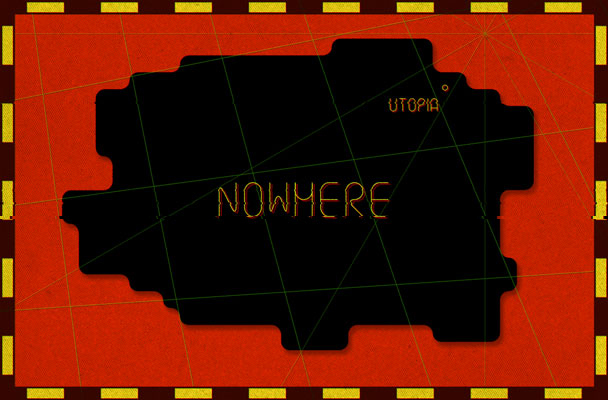Utopia means an actual, public-political organisation of living together, a democratic approach to human life, to production and care, collaboration and research, interaction and creativity, learning and questioning, community and individuality, participation as well as withdrawal.
by Anna Katarrh
Illustrations by Thom Cuschieri
1. Utopia, Nowhere
Utopia is a place that is also a no-place (ou-topos: no-place, nowhere). Utopian thought is concerned with material structures, with concrete notions of a better socio-political world, situated in the here and now, ‘placed’ in our world. At the same time, it is directed towards a no-place, that is, a political space of democratic dispute and practices, based on equality, thus, a universal space: open for everyone, accessible from everywhere, itself nowhere.
Thomas More’s invention of utopia as an artificial island does not mean that political utopia is a self-enclosed and isolated insular space. Rather, it is a political public, not restricted by national belonging or constructions of exclusive identities. It is an island in close correspondence with its surrounding waters; its watery boundaries suggest openness, not closure.
[beautifulquote align=”left” cite=””]Utopia will always remain nowhere because it implies the unending critique of all structures which establish and serve exclusion and inequality.[/beautifulquote]
Why is utopia nowhere? Utopia will always remain nowhere because it implies the unending critique of all structures which establish and serve exclusion and inequality. It is the continuous practice of democracy. Therefore, it does not refer to an ultimate aim or an absolute state, but it means the creation of new socio-political conditions for new possibilities of equal human beings living together.
Utopia is an experimental space—removed, as is More’s literary island, from the constraints of hegemonic ‘realism’. The seemingly neutral, self-evident stance of ‘realism’ is no more than an affirmation of the status quo: Existing reality doubles as the only realist option. Therefore, current ‘realism’ is the affirmation of the economic as well as political and ideological system of (neo)liberal capitalism. It is in this sense that utopia is an artificial island: in its negative, critical relationship to the existing world at large, it is a man-made, created island outside of dominant constructions of the real and so-called normality and their assumptions of ‘natural’ circumstances and developments. Utopia offers alternative imaginings, counter-constructions. It is a strong reminder that history is man-made, it is change made by us for better or worse—and with vastly different opportunities for influential action within the existing framework of power hierarchies and distributions of material means and socio-political access. Utopia signals that a place outside of these hegemonic structures is needed as a starting point for radical change.
Utopia is not an ideal state in which all desires are fulfilled—but it is neither the desired state endlessly postponed: utopian thought strives for a realisation of its demands. It starts now here: as a critical no-place outside of dominant discourses and spaces; it is the creation of a new place, of new political formations and public spaces, a new now here, as yet nowhere.

2. The Scale of Utopia
[beautifulquote align=”full” cite=””]To begin with, the left is not very good at answering the question of how we build massive infrastructures. How will the left build the Brooklyn Bridge, for example? (David Harvey in an interview to Roar Magazine)[/beautifulquote]
Utopia is a large-scale project, it is massive, it concerns the masses, it concerns the world. But, of course, the big is connected to the small, the massive has its tiny components. Utopia is, therefore, big and small.
In alternative political movements, the importance of local struggles is often emphasised. From a utopian perspective, local struggles are linked to universal struggles. This link is first of all created by the global economic-political conditions of capitalism, which establish the connection of local demands to global antagonisms. Secondly, a utopian struggle based on the notion of equality never remains solely local since it transcends the focus on exclusive communities. If it fights for a specific community, it also fights for the general possibility of local communities to exist, which means fighting for a redistribution of material means and socio-political freedom.
Utopia as a political project recognises the importance of large-scale organisation and logistics for using global resources globally, so as not to revert to a limiting dependence on contingent local conditions but to create an interdependence of human beings opposed to the dependence based on exploitation in global capitalism. If the left, as David Harvey suggests, has become bad at “answering the question of how we build massive infrastructures”, utopian thought seeks to redress this omission. In his essay “Utopia as Method”, Fredric Jameson argues for a utopian perspective on large-scale capitalist enterprises. This is an instigation to look at the possibilities of technologies, practices and knowledge—now predominantly shaped by their application within capitalist structures—in the light of a different system. A utopian perspective on globalisation imagines different possible uses of global means of production, communication, transport and exchange on a large scale.
[beautifulquote align=”left” cite=””]Large-scale utopia is made up of small-scale practices and the creation of different utopian communities. These are not based on exclusive identities, but on debate, interaction and collaboration.[/beautifulquote]
Utopia, however, is also small-scale: obviously, fundamental change and a different global organisation depend on local struggles, concrete political formations and possibilities of experiencing different forms of living together in the now and here. Large-scale utopia is made up of small-scale practices and the creation of different utopian communities. These are not based on exclusive identities, but on debate, interaction and collaboration. Utopian politics are small-scale struggles, small-scale everyday life practices which at the same time recognise their connection to large-scale socio-political conditions and ultimately direct their demands towards changing these.

3. Utopia as Common Place
Utopian politics is based on ideas of the common, of common property and political publics. It is politics by and for ‘common’ people, not elites; even if these are masked, as is currently the case, as democratic representatives, intellectual or scientific experts and agents of economic ‘growth’—a growth that is based on the often lamented, but systemically induced, and therefore tacitly accepted ‘gap’ between rich and poor, between privileged and ‘common’. Utopian thought starts from the radical disagreement with such a ‘gap’. It foregrounds the vast differences in possibilities for a good life this gap brings about: material, often deadly differences, and the accompanying differences in education, intellectual, cultural and social opportunities.
Utopia opposes a negative view of the masses—reflected, for example, in the negative connotations of the ‘commonplace’. This view is often veiled by references to the empty signifier of ‘democracy’, in reality a government that reins in the desires of the ‘common people’ in the name of capitalism and those who profit from it.
Utopia is not private. It is opposed to the predominant direction which visions of a better future take in current societies: the private realm, the home, the family and private economic success. “Private: No Entry” is a sign often encountered barring access to natural and built places. Yet still, the private sphere is associated widely with individual freedom, even though the usual way of hitting upon it is in the form of restrictions of movement, access and appropriation.
[beautifulquote align=”left” cite=””]Utopia means an actual, public-political organisation of living together, a democratic approach to human life, to production and care, collaboration and research, interaction and creativity, learning and questioning, community and individuality, participation as well as withdrawal.[/beautifulquote]
In a system based on private property, freedom within the place of no entry for the other is, obviously, dependent on one’s material means. There is, thus, not a question of freedom versus equality, as it is often posed, but an already existing, tangible material connection between freedom and inequality. In opposition to this, utopia is a common place in a positive sense. It radically rejects the exclusions created by private property and the private economy of capitalism. This does not mean that small, intimate spaces and possessions are non-existent in utopia. But the private as the basis of economic ‘organisation’ is rejected. In this way, utopia means an actual, public-political organisation of living together, a democratic approach to human life, to production and care, collaboration and research, interaction and creativity, learning and questioning, community and individuality, participation as well as withdrawal. The manifold spaces now occupied by private economic agents are reclaimed as democratic common places.
If utopia becomes a commonplace, we all speak about it, we all fight for and contribute to a better political-public world, we meet in utopia—not in consensus and stasis, but in dispute and interaction. We create a no-place beyond the existing structures of material, social and political exclusion, and we build new structures and forms of organisation, reinscribing utopia on the map of the world and fighting for its realisation now here.

Anna Katarrh teaches and researches in the fields of cultural studies and political theory; she is co-founder of the Institute of Utopian Studies, which is—for the time being—a utopian institution seeking to provide a platform for debate about ideas of radical socio-political change.
Thomas Cuschieri is a mathematician who draws comics. He’s sorry about that thing with the cake and the trampoline and promises it’ll never happen again. Twitter: @thomcuschieri Web: thomcuschieri.com
This article originally appeared on June 2016 issue of Schlock Magazine. It has been published here with permission.

Utopian Nights: Inside the Border will be taking place from Monday 30th July to Sunday 5th August 2018.

Leave a Reply